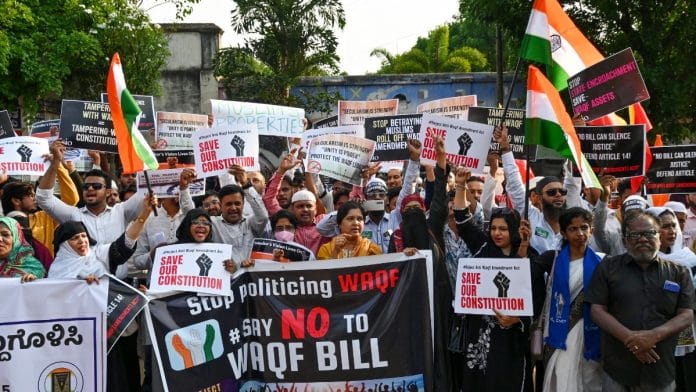New Delhi: A Supreme Court bench led by Chief Justice of India Sanjiv Khanna and comprising justices Sanjay Kumar and K.V. Viswanathan Monday said it would hear a bunch of petitions challenging the constitutional validity of the new Waqf (Amendment) Act in due time.
The petitioners, including the All India Muslim Personal Law Board (AIMPLB), the Jamiat Ulama-i-Hind, All India Majlis-e-Ittehadul Muslimeen (AIMIM) leader Asaduddin Owaisi, Congress MP Mohammad Jawed, and AAP MLA Amanatullah Khan, had sought an urgent hearing, amid mass protests against the controversial Act.
The AIMPLB, which mobilised the street resistance, has asserted that the amendments not only violate the fundamental rights guaranteed under Articles 25 and 26 of the Constitution, but also “clearly reveal the government’s intention to take complete control over the administration of waqf, thereby sidelining the Muslim minority from managing their own religious endowments”.
President Droupadi Murmu on Saturday gave her assent to the Waqf (Amendment) Bill, which was passed by both houses of Parliament after heated debates last week. The Lok Sabha had cleared it in the early hours of Thursday by a 288-232 vote, despite strong objections from opposition parties. The Rajya Sabha passed the bill after an unprecedented 17-hour debate, in the early hours of Friday with a 128-95 vote.
Anti-waqf Act protests have turned volatile in parts of the country including Kolkata, Chennai, Ahmedabad, Muzaffarnagar and Manipur, and have been met with police crackdowns. In Uttar Pradesh, over 300 protesters were reportedly served notices and asked to furnish Rs 2 lakh bonds each for wearing black armbands during Friday prayers on 28 March.
Comparisons have been drawn with the anti-CAA movement and the farmers’ protests, both of which forced government retractions.
“This Act is unconstitutional and discriminatory,” AIMPLB spokesperson Syed Qasim Rasool Ilyas told ThePrint, further alleging that it strips Muslims of rights granted to other religious communities to manage their religious properties and institutions. “It places arbitrary restrictions and undermines the very essence of waqf as a charitable and religious trust.”
Also Read: Hindu temples’ properties to ‘encroacher protection’—key debates on Waqf Bill before it cleared RS
‘SC protector of fundamental rights’
The Waqf (Amendment) Act, 2025, introduces major reforms in the Central Waqf Council as well as the state waqf boards, like the inclusion of non-Muslim members in the boards, as well as the removal of the long-standing principle of ‘waqf by user’. According to the minority affairs ministry, the main purpose of the Act is to improve the management of waqf properties in India.
Muslims fear the new law could give the government far greater control over Muslim properties. Waqf refers to properties that are dedicated exclusively to religious purposes under Islamic law.
Ilyas said AIMPLB moved the SC because the Act is “discriminatory” and is against the “fundamental rights of Muslims in India.”
“It discriminates against Muslims. Similar protections were given to other endowments by Hindus or Sikhs or Christians and Jains, but we have been denied those protections,” he added.
He further said that so many conditions have been added to the new Act that it “deprives” Muslims of the control of waqf boards and the Central Waqf Council. “Also, they have put a condition that anybody who wants to donate their land as a waqf property, should be a practicing Muslim at least for five years,” he said, adding that it is “unconstitutional”.
“We have asked the Supreme Court because it is the protector of fundamental rights of the people,” Ilyas said.
Senior Supreme Court advocate M.R. Shamshad told ThePrint the Act not only violates fundamental rights but also curbs the formation and independent administration of waqf properties. “This is a serious infringement of constitutional protections. The legal route is the rightful path for redress, and we await judicial scrutiny,” he said.
Shamshad further said that the right to peaceful protest is the right of every citizen of India. “If the government is taking action against those protesters who are doing peaceful protest, I think those actions are not in consonance with law. They are excessive in nature.”
Syed Sadatullah Husaini, president of JIH, said the Act is the government’s “attempt to ruin” the waqf system. “The legal route to oppose the Act is through the Supreme Court, and the political route is through mass mobilisation and political pressure-building. We want to follow both the routes,” he told ThePrint.
On Sunday night, a mob set fire to the house of the BJP Minority Morcha’s Manipur president Asker Ali over his alleged support to the Act.
Meanwhile, Tamil Nadu Chief Minister M.K. Stalin announced in the assembly that the DMK will move the Supreme Court against the Waqf Act, declaring, “Tamil Nadu will fight and emerge victorious.” Stalin, who wore a black ribbon in protest, said the Act was not only discriminatory but part of a broader agenda to marginalise Muslims.
Kashmir’s Mirwaiz Umar Farooq took to social media to denounce the Act, writing, “Things are fast regressing for Muslims in this country. The highly marginalising Waqf Bill doesn’t make it far-fetched to imagine a future where Muslims may need permits to enter mosques or be buried in graveyards.”
JIH president Husaini also raised a cautionary note, urging non-Muslims to take note. “This is the first step. If the government can do this to Muslims, they may next target religious endowments of other communities.”
(Edited by Gitanjali Das)
Also Read: ‘Even Parliament could’ve been claimed as Waqf property’: Kiren Rijiju defends amendment bill in LS






